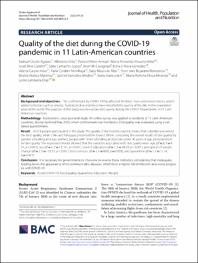Mostrar el registro sencillo del ítem
Quality of the diet during the COVID-19 pandemic in 11 Latin-American countries
| dc.contributor.author | Durán‑Agüero, Samuel | es_ES |
| dc.contributor.author | Ortiz, Alfonsina | es_ES |
| dc.contributor.author | Pérez‑Armijo, Patricio | es_ES |
| dc.contributor.author | Vinueza‑Veloz, María Fernanda | es_ES |
| dc.contributor.author | Ríos‑Castillo, Israel | es_ES |
| dc.contributor.author | Camacho‑Lopez, Saby | es_ES |
| dc.contributor.author | Cavagnari, Brian M. | es_ES |
| dc.contributor.author | Nava‑González Edna J. | es_ES |
| dc.contributor.author | Carpio‑Arias, Valeria | es_ES |
| dc.contributor.author | Cordón‑Arrivillaga, Karla | es_ES |
| dc.contributor.author | Mauricio‑Alza, Saby | es_ES |
| dc.contributor.author | Bejarano Roncancio, Jhon Jairo | es_ES |
| dc.contributor.author | Nuñez‑Martínez, Beatríz | es_ES |
| dc.contributor.author | González‑Medina, Gabriel | es_ES |
| dc.contributor.author | Ivancovich, Sonia | es_ES |
| dc.contributor.author | Meza‑Miranda, Eliana Romina | es_ES |
| dc.contributor.author | Landaeta‑Díaz, Leslie | es_ES |
| dc.date.accessioned | 2022-11-18T17:41:45Z | |
| dc.date.available | 2022-11-18T17:41:45Z | |
| dc.date.issued | 2022-08-04 | |
| dc.identifier.uri | https://hdl.handle.net/20.500.13053/7157 | |
| dc.description.abstract | “Background and objectives: The confnement by COVID-19 has afected the food chain and environments, which added to factors such as anxiety, frustration, fear and stress have modifed the quality of the diet in the population around the world. The purpose of this study was to explore diet quality during the COVID-19 pandemic in 11 Latin American countries. Methodology: Multicentric, cross-sectional study. An online survey was applied to residents of 11 Latin-American countries, during April and May 2020, when confnement was mandatory. Diet quality was evaluated using a vali‑ dated questionnaire. Result: 10,573 people participated in the study. The quality of the food by country shows that Colombia presented the best quality, while Chile and Paraguay presented the lowest. When comparing the overall results of diet quality by gender, schooling and age, women, people with more schooling and people under 30 years of age, presented bet‑ ter diet quality. The regression model showed that the variables associated with diet quality were: age (df=3, F=4. 57, p<0.001), sex (df=1, F=131.01, p<0.001), level of education (df=1, F=38.29, p<0.001), perception of weight change (df=2, F=135.31, p<0.001), basis services (df=1, F=8.63, p=0.003), and quarantine (df=1, F=12.14, p=0.001). Conclusion: It is necessary for governments to intervene to reverse these indicators, considering that inadequate feeding favors the appearance of no communicable diseases, which favor a higher risk of infection and worse progno‑ sis with COVID-19.“ | es_ES |
| dc.format | application/pdf | es_ES |
| dc.language.iso | eng | es_ES |
| dc.publisher | BMC | es_ES |
| dc.rights | info:eu-repo/semantics/openAccess | es_ES |
| dc.rights.uri | https://creativecommons.org/licenses/by/4.0/ | es_ES |
| dc.subject | Food, COVID-19, Food quality, Quarantine, Education, Weight | es_ES |
| dc.title | Quality of the diet during the COVID-19 pandemic in 11 Latin-American countries | es_ES |
| dc.type | info:eu-repo/semantics/article | es_ES |
| dc.identifier.doi | https://doi.org/10.1186/s41043-022-00316-8 | es_ES |
| dc.type.version | info:eu-repo/semantics/publishedVersion | es_ES |
| dc.publisher.country | GB | es_ES |
| dc.subject.ocde | http://purl.org/pe-repo/ocde/ford#3.03.00 | es_ES |
Ficheros en el ítem
Este ítem aparece en la(s) siguiente(s) colección(es)
-
Web of Science (WOS) [236]


